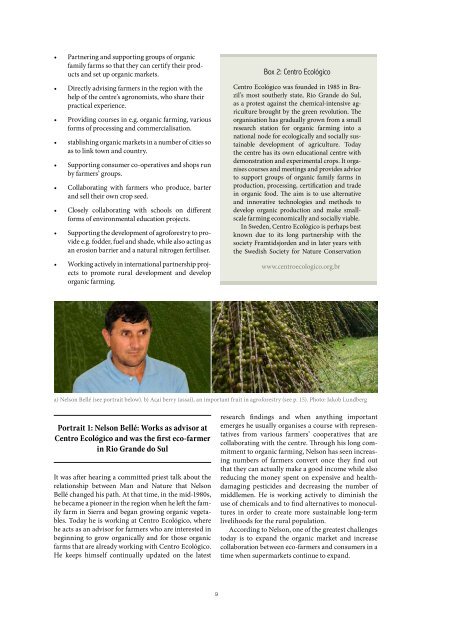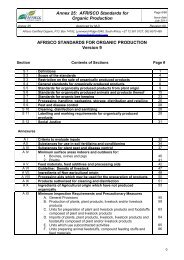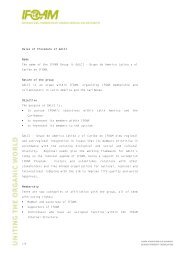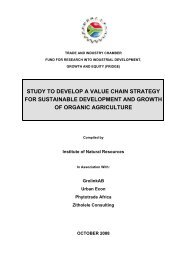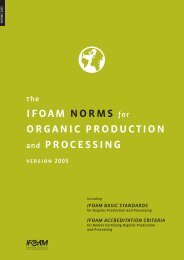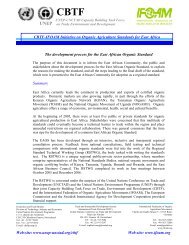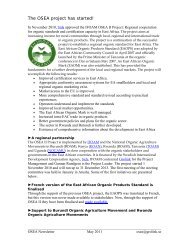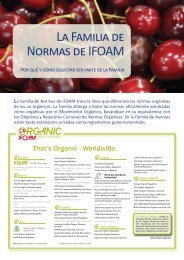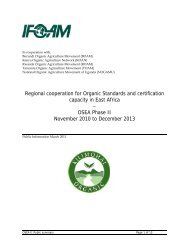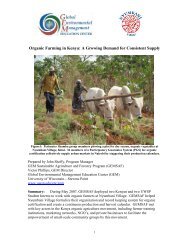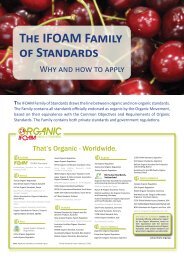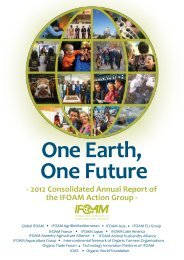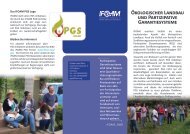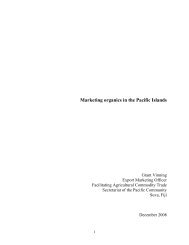Organic farming in Brazil - ifoam
Organic farming in Brazil - ifoam
Organic farming in Brazil - ifoam
Create successful ePaper yourself
Turn your PDF publications into a flip-book with our unique Google optimized e-Paper software.
• Partner<strong>in</strong>g and support<strong>in</strong>g groups of organic<br />
family farms so that they can certify their products<br />
and set up organic markets.<br />
• Directly advis<strong>in</strong>g farmers <strong>in</strong> the region with the<br />
help of the centre’s agronomists, who share their<br />
practical experience.<br />
• Provid<strong>in</strong>g courses <strong>in</strong> e.g. organic <strong>farm<strong>in</strong>g</strong>, various<br />
forms of process<strong>in</strong>g and commercialisation.<br />
• stablish<strong>in</strong>g organic markets <strong>in</strong> a number of cities so<br />
as to l<strong>in</strong>k town and country.<br />
• Support<strong>in</strong>g consumer co-operatives and shops run<br />
by farmers’ groups.<br />
• Collaborat<strong>in</strong>g with farmers who produce, barter<br />
and sell their own crop seed.<br />
• Closely collaborat<strong>in</strong>g with schools on different<br />
forms of environmental education projects.<br />
• Support<strong>in</strong>g the development of agroforestry to provide<br />
e.g. fodder, fuel and shade, while also act<strong>in</strong>g as<br />
an erosion barrier and a natural nitrogen fertiliser.<br />
• Work<strong>in</strong>g actively <strong>in</strong> <strong>in</strong>ternational partnership projects<br />
to promote rural development and develop<br />
organic <strong>farm<strong>in</strong>g</strong>.<br />
Box 2: Centro Ecológico<br />
Centro Ecológico was founded <strong>in</strong> 1985 <strong>in</strong> <strong>Brazil</strong>’s<br />
most southerly state, Rio Grande do Sul,<br />
as a protest aga<strong>in</strong>st the chemical-<strong>in</strong>tensive agriculture<br />
brought by the green revolution. The<br />
organisation has gradually grown from a small<br />
research station for organic <strong>farm<strong>in</strong>g</strong> <strong>in</strong>to a<br />
national node for ecologically and socially susta<strong>in</strong>able<br />
development of agriculture. Today<br />
the centre has its own educational centre with<br />
demonstration and experimental crops. It organises<br />
courses and meet<strong>in</strong>gs and provides advice<br />
to support groups of organic family farms <strong>in</strong><br />
production, process<strong>in</strong>g, certification and trade<br />
<strong>in</strong> organic food. The aim is to use alternative<br />
and <strong>in</strong>novative technologies and methods to<br />
develop organic production and make smallscale<br />
<strong>farm<strong>in</strong>g</strong> economically and socially viable.<br />
In Sweden, Centro Ecológico is perhaps best<br />
known due to its long partnership with the<br />
society Framtidsjorden and <strong>in</strong> later years with<br />
the Swedish Society for Nature Conservation<br />
www.centroecologico.org.br<br />
a) Nelson Bellé (see portrait below). b) Aςaí berry (assai), an important fruit <strong>in</strong> agroforestry (see p. 15). Photo: Jakob Lundberg<br />
Portrait 1: Nelson Bellé: Works as advisor at<br />
Centro Ecológico and was the first eco-farmer<br />
<strong>in</strong> Rio Grande do Sul<br />
It was after hear<strong>in</strong>g a committed priest talk about the<br />
relationship between Man and Nature that Nelson<br />
Bellé changed his path. At that time, <strong>in</strong> the mid-1980s,<br />
he became a pioneer <strong>in</strong> the region when he left the family<br />
farm <strong>in</strong> Sierra and began grow<strong>in</strong>g organic vegetables.<br />
Today he is work<strong>in</strong>g at Centro Ecológico, where<br />
he acts as an advisor for farmers who are <strong>in</strong>terested <strong>in</strong><br />
beg<strong>in</strong>n<strong>in</strong>g to grow organically and for those organic<br />
farms that are already work<strong>in</strong>g with Centro Ecológico.<br />
He keeps himself cont<strong>in</strong>ually updated on the latest<br />
research f<strong>in</strong>d<strong>in</strong>gs and when anyth<strong>in</strong>g important<br />
emerges he usually organises a course with representatives<br />
from various farmers’ cooperatives that are<br />
collaborat<strong>in</strong>g with the centre. Through his long commitment<br />
to organic <strong>farm<strong>in</strong>g</strong>, Nelson has seen <strong>in</strong>creas<strong>in</strong>g<br />
numbers of farmers convert once they f<strong>in</strong>d out<br />
that they can actually make a good <strong>in</strong>come while also<br />
reduc<strong>in</strong>g the money spent on expensive and healthdamag<strong>in</strong>g<br />
pesticides and decreas<strong>in</strong>g the number of<br />
middlemen. He is work<strong>in</strong>g actively to dim<strong>in</strong>ish the<br />
use of chemicals and to f<strong>in</strong>d alternatives to monocultures<br />
<strong>in</strong> order to create more susta<strong>in</strong>able long-term<br />
livelihoods for the rural population.<br />
Accord<strong>in</strong>g to Nelson, one of the greatest challenges<br />
today is to expand the organic market and <strong>in</strong>crease<br />
collaboration between eco-farmers and consumers <strong>in</strong> a<br />
time when supermarkets cont<strong>in</strong>ue to expand.<br />
9


